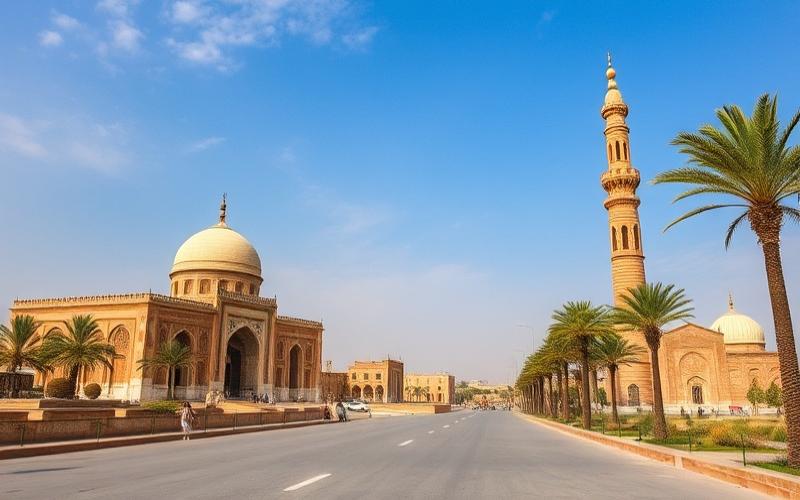
 Published on and written by Cyril Jarnias
Published on and written by Cyril Jarnias
Bahrain, a dynamic archipelago in the heart of the Persian Gulf, attracts numerous expatriates with its rapidly growing economy and rich cultural heritage. However, the question of legal protection for these foreign residents often arises.
Anti-discrimination laws play a crucial role in promoting equality and protecting everyone’s rights in this diverse country. As Bahrain works to position itself as a modern and inclusive nation, it is essential to examine not only the impact of these laws but also their accessibility and applicability for the expatriate community.
This analysis explores the various remedies and mechanisms in place to ensure a safe and fair environment for all non-national residents.
Overview of Anti-Discrimination Laws in Bahrain
Key Anti-Discrimination Laws in Effect in Bahrain:
- Constitution of the Kingdom of Bahrain: Establishes equality among all citizens and prohibits discrimination based on sex, race, language, religion, or social origin.
- Law No. 36/2012 on Private Sector Labor: Prohibits workplace discrimination, guarantees equal pay between men and women, and protects female workers’ rights, particularly regarding maternity leave and protection from dismissal due to marriage or maternity.
- Decree No. 5/2002: Bahrain acceded to the Convention on the Elimination of All Forms of Discrimination Against Women (CEDAW), committing to abolish discriminatory provisions in national law.
- Nationality Law of 1963: Still in effect, it contains discriminatory provisions, notably the inability of a Bahraini woman to pass her nationality to her children if the father is foreign.
| Law / Provision | Scope | Implications for Expatriates |
|---|---|---|
| Constitution | All citizens | Expatriates are not explicitly included, but some protections apply in the workplace. |
| Law No. 36/2012 | Private sector | Protects expatriate employees on Bahraini soil. |
| Decree No. 5/2002 (CEDAW) | Gender-based discrimination | Limited application, especially in family and nationality law. |
| Nationality Law of 1963 | Nationality attribution | Unfavorable to children born to Bahraini mothers and foreign fathers. |
Application to Expatriates:
- Expatriates primarily benefit from protections under the Labor Law: prohibition of employment discrimination, equal pay, protection against wrongful dismissal due to maternity or marriage.
- Rights related to nationality or family remain limited for expatriates; they cannot obtain nationality through maternal lineage and are subject to restrictions on family reunification.
Legal Protections for Discrimination Victims:
- Victims can file a complaint with the Ministry of Labor for employment-related issues.
- Disputes can be brought before labor courts, which have jurisdiction over discrimination cases, including for expatriates.
- Expatriate female employees are entitled to maternity rights, equal treatment, and recourse mechanisms in case of wrongful dismissal.
Remedial Procedures for Expatriates:
- Administrative complaint to the Ministry of Labor.
- Filing a case with labor courts if administrative mediation fails.
- Possibility of recourse to international organizations or embassies, particularly when discrimination involves nationality or personal status issues.
Examples of Enforcement Cases and Challenges:
- Cases of wrongful dismissal of expatriate female workers due to pregnancy or marriage have resulted in court rulings in favor of employees, but enforcement remains uneven.
- Persistent discrimination exists in access to nationality for children born to Bahraini mothers and foreign fathers, leading to administrative insecurity.
- Expatriate domestic workers remain vulnerable to discrimination and exploitation, despite existing laws.
Implementation Gaps and Challenges:
- Laws are sometimes poorly enforced, particularly for low-skilled migrant workers and domestic workers.
- Institutional discrimination, especially in nationality and family law, is not yet fully addressed by legislation.
- The environment for civil society is restricted, limiting the effectiveness of advocacy and victim support.
Involved Bodies:
- Ministry of Labor: Receives and processes complaints of employment discrimination.
- Supreme Council for Women: Promotes women’s rights and monitors public policies on equality.
- Civil society organizations: Their role is limited by legal restrictions, but they engage in awareness-raising and documenting cases.
- National Human Rights Committee: Official institution responsible for promoting and protecting human rights, including combating discrimination.
Key Takeaway:
Expatriates in Bahrain benefit from legal protections against discrimination mainly in employment but face significant limitations regarding nationality, family law, and protection against certain forms of institutional discrimination. Remedial mechanisms exist, but their effectiveness heavily depends on political will and institutional capacity.
Good to Know:
Law No. 58 in effect in Bahrain prohibits discrimination based on sex, race, and religion, but it does not explicitly cover sexual orientation; expatriates can file complaints with the Labor Authority, although implementation is sometimes limited by insufficient awareness and lack of corporate support.
Protection Mechanisms for Expatriates
Key Anti-Discrimination Laws in Bahrain Applicable to Expatriates:
| Law / Regulation | Scope | Protected Groups |
|---|---|---|
| Private Sector Labor Law | All aspects of employment (recruitment, hiring, promotion, salary, termination, etc.) | Race, religion, sex, language, social origin |
| International Convention on the Elimination of All Forms of Racial Discrimination (incorporated into national law) | All forms of racial discrimination and incitement to racial hatred | All, including expatriates |
| Penal Code (sanctions against incitement to racial hatred) | Acts of incitement to racial hatred | All, including expatriates |
Institutions Responsible for Implementation and Protection of Expatriates’ Rights:
- Ministry of Labor and Social Development: Oversees compliance with anti-discrimination laws, receives and processes complaints.
- Civil courts: Intervene if a conflict is not resolved by the ministry within two weeks, at no cost to the complainant.
- Legal assistance: Guaranteed to all, including expatriates.
- Royal Diwan, Prime Minister’s Office, Crown Prince’s Office: Other authorities where complaints can be filed.
Legal Procedures and Available Remedies for Expatriate Discrimination Victims:
- Filing a complaint with the Ministry of Labor.
- If the complaint is not resolved within two weeks, automatic referral to civil court, with free procedure and guaranteed legal assistance.
- Possibility to directly approach the highest authorities (Royal Diwan, Prime Minister, Crown Prince).
- Possible types of compensation:
- Reinstatement in employment or cancellation of the discriminatory measure.
- Financial compensation for damages suffered.
- Disciplinary or criminal sanctions against the offending employer.
- Other remedies ordered by the courts.
Example Procedure for Filing a Discrimination Complaint:
- The expatriate employee believes they have suffered discrimination (e.g., denial of promotion based on nationality).
- They file a complaint with the Ministry of Labor through dispute resolution channels.
- If unresolved within two weeks, the complaint is referred to civil courts.
- A hearing takes place, and the employee receives legal assistance.
- The court rules and may order compensation or remedies.
How These Mechanisms Strengthen the Work and Living Environment for Expatriates:
- Equality guarantees: Expatriates enjoy the same employment rights as citizens, promoting a fair and inclusive work environment.
- Accessible recourse pathways: Free procedures and legal assistance make mechanisms accessible even for expatriates with limited resources.
- Protection against retaliation: Penal Code sanctions against incitement to racial hatred deter discriminatory behavior.
- Climate of trust: The existence of official remedies encourages expatriates to report abuses and defend their rights.
Potential Challenges When Using These Protections:
- Lack of awareness of procedures among some expatriates, especially those unfamiliar with local legislation or language.
- Administrative delays or difficulties in obtaining a quick resolution, despite the official two-week deadline.
- Social or professional pressures that may deter some expatriates from filing complaints.
- Difficulty gathering evidence in cases of indirect or subtle discrimination.
Summary of Protections and Challenges:
| Strengths | Potential Challenges |
|---|---|
| Clear laws applicable to all | Lack of information among some expatriates |
| Free procedures and legal assistance | Administrative delays or complexity |
| Multiple hierarchical recourse options | Social or professional pressures |
| Deterrent sanctions against discrimination | Difficulty proving certain discrimination cases |
Good to Know:
In Bahrain, the Social Protection Law prohibits discrimination based on gender, origin, or family status, with the Labor Protection Directorate ensuring its enforcement; expatriates can file a complaint with this institution to obtain redress and potentially financial compensation. Challenges include administrative complexity and the need to master the local language to effectively navigate the legal process.
Available Remedies in Case of Discrimination
Anti-Discrimination Laws in Effect in Bahrain
| Legal Basis | Relevant Article | Scope |
|---|---|---|
| Private Sector Labor Law | – | Private employment, non-discrimination on race, religion, sex, language, social origin |
| Bahrain Constitution | Article 18 | General principle of equality and non-discrimination before the law |
Bahraini laws protect against employment discrimination based on race, religion, sex, language, and social origin. The Constitution (Article 18) affirms equality before the law but reserves certain rights exclusively for Bahraini citizens. This limitation can affect expatriates.
Competent Authorities for Filing a Complaint
- Ministry of Labor and Social Development
- National Human Rights Committee
- International organizations or local NGOs (e.g., OMCT)
Some large companies also have internal committees to handle discrimination-related complaints.
Complaint Filing Process
- Gather evidence:
- Contracts or employment-related documents
- Written correspondence (emails)
- Witness testimonies
- Identification documents
- File a complaint:
- With the Ministry of Labor through their official portal or in person.
- With internal committees if available.
- Timeline:
- It is recommended to act as soon as possible after an incident; some remedies may be subject to specific legal deadlines depending on the case.
- Follow-up:
- The Ministry reviews the case and may organize mediation between parties.
- If no solution is found at this administrative/amicable stage:
- Judicial recourse possible before competent courts.
Required Documents
- Passport/residency card
- Employment contract
- Documentary evidence (correspondence)
- Certificates/testimonies
Mediation and Judicial Actions
Mediation is often encouraged by the Ministry before any formal judicial procedure:
- Advantages: faster resolution; lower costs; possibility of amicable settlement.
If no agreement is reached:
| Judicial Action | Potential Implications |
|---|---|
| Filing with courts | Lengthy procedure; legal fees; public judgment |
| Appeal | Possible if first instance is unfavorable |
Sanctions can be imposed against employers found guilty: administrative fines or even compensation.
Resources & Organizations Offering Assistance to Expatriate Victims
- National Human Rights Committee
- Local International Labor Office in Bahrain
- OMCT (World Organization Against Torture)
- Foreign community associations
These organizations provide free legal guidance or refer to specialized lawyers.
To maximize chances in a recourse, it is essential for any expatriate victim to quickly gather all supporting documents, keep a detailed journal of incidents suffered, and promptly seek advice from a local specialized organization.
Precedents and Significant Developments
Although there is not yet much published jurisprudence specifically favorable to expatriate victims—particularly regarding racial or religious discrimination—several public interventions have pushed for institutional strengthening through:
- Gradual expansion of the scope covered by anti-discrimination laws
- New initiatives to facilitate access to official mechanisms for all foreign workers
Reforms often follow international pressure or recommendations from various human rights NGOs.
Summary List: Recommended Immediate Actions
- Quickly consult a dedicated organization (National Committee/OMCT)
- Collect all written/digital evidence related to the harm suffered
- Verify applicable legal deadlines according to contractual status
- Initially prioritize amicable/administrative approach before any litigation
Good to Know:
In Bahrain, expatriates can file complaints with the National Institution for Human Rights or the Interior Ministry’s Ombudsman in case of discrimination, with a filing deadline generally of one year from the incident. It is crucial to include written evidence, and organizations like Migrant Workers Protection Society can provide practical and legal support.
The Role of the Protection Commission in Bahrain
The protection commission in Bahrain, in the context of anti-discrimination laws, plays a central role in defending fundamental rights, although its structure, independence, and effectiveness are subjects of debate and criticism.
Integration into the Legal and Institutional System
- The commission, or human rights committee, fits within Bahrain’s international commitments, particularly through ratification of conventions like CEDAW (Convention on the Elimination of All Forms of Discrimination Against Women) and the International Convention on the Elimination of All Forms of Racial Discrimination.
- Its action is guided by the Bahraini Constitution, which explicitly prohibits discrimination based on sex, origin, language, religion, or belief (Article 18).
- However, the human rights commission, which had a monitoring mission, was abolished, and its potential replacement by a new entity remains unclear. Current mechanisms rely mainly on governmental bodies, particularly the Ministry of Labor and judicial instances.
Main Responsibilities
- Monitoring enforcement of anti-discrimination laws: Ensures application of national and international standards, proposes recommendations to address legislative and administrative gaps.
- Handling complaints: Receives and processes complaints, particularly those from expatriates or migrant workers, who constitute a significant part of the population and are frequently exposed to discrimination and exploitation.
- Public awareness: Conducts information campaigns on rights, in collaboration with NGOs and international partners.
Examples of Specific Responsibilities
| Responsibility | Description | Concrete Example |
|---|---|---|
| Receiving complaints | Accepts reports of racial, religious, or gender discrimination | Cases of Asian workers housed in degrading conditions reported by BCHR |
| Legislative monitoring | Analyzes laws, recommends modifications to strengthen protection | Recommendations to improve the nationality law |
| Awareness-raising | Organizes seminars, distributes rights guides | Campaigns against stigmatization of migrant workers |
Challenges Faced
- Lack of independence: The commission often depends on the executive branch, limiting its ability to act against systemic discrimination or openly criticize the state.
- Restricted access to judicial remedies: Expatriate workers must generally file complaints with the Ministry of Labor, often leading to “amicable” settlements without genuine redress.
- Political and social pressures: Actions promoting equality are sometimes equated with acts of dissent or betrayal, particularly for independent NGOs.
- Persistent legislative gaps: Nationality legislation continues to discriminate against women and their children, despite international commitments.
Examples of Cases Handled
- Discrimination against migrant workers: The Bahrain Centre for Human Rights denounced residential segregation imposed on Asian workers, considered discriminatory and racist.
- Complaints regarding access to nationality: NGOs regularly document cases of stateless children born to Bahraini mothers and foreign fathers.
Collaboration with Other Bodies
Cooperates with UN agencies (like the Committee on the Elimination of Racial Discrimination) for report drafting and implementation of recommendations.
Participates in joint initiatives with national and international NGOs to improve legislation and administrative practices.
Impact on Expatriates’ Lives
The commission has helped highlight expatriates’ living and working conditions, fostering greater public awareness and some regulatory improvements (e.g., minimum housing standards).
However, impact remains limited by structural lack of independence, insufficient effective sanctions, and persistence of institutional discrimination, particularly against women, religious minorities, and migrant workers.
Persistent Main Challenges
- Institutional independence: Weak autonomy from the executive
- Limited investigative power: Difficulty accessing certain files or imposing sanctions
- Social pressure: Hostility towards defending minority and expatriate rights
- Insufficient remedies: Victims rarely obtain redress in courts
Visual Summary of Challenges and Actions
| Main Challenges | Actions Undertaken or Recommended |
|---|---|
| Lack of independence | Strengthen commission autonomy |
| Legislative gaps | Reform nationality and labor laws |
| Limited access to justice | Simplify complaint filing procedure |
| Political and social pressures | Increase cooperation with NGOs |
The protection commission in Bahrain remains an essential but limited actor in the fight against discrimination, particularly for expatriates. Its effectiveness will depend on its ability to gain independence, strengthen procedural transparency, and collaborate closely with national and international stakeholders.
Good to Know:
The protection commission in Bahrain plays a key role in monitoring the enforcement of anti-discrimination laws, handling expatriate complaints, and raising public awareness, but it often faces obstacles related to its independence and collaboration with other bodies.
Disclaimer: The information provided on this website is for informational purposes only and does not constitute financial, legal, or professional advice. We encourage you to consult qualified experts before making any investment, real estate, or expatriation decisions. Although we strive to maintain up-to-date and accurate information, we do not guarantee the completeness, accuracy, or timeliness of the proposed content. As investment and expatriation involve risks, we disclaim any liability for potential losses or damages arising from the use of this site. Your use of this site confirms your acceptance of these terms and your understanding of the associated risks.





























































